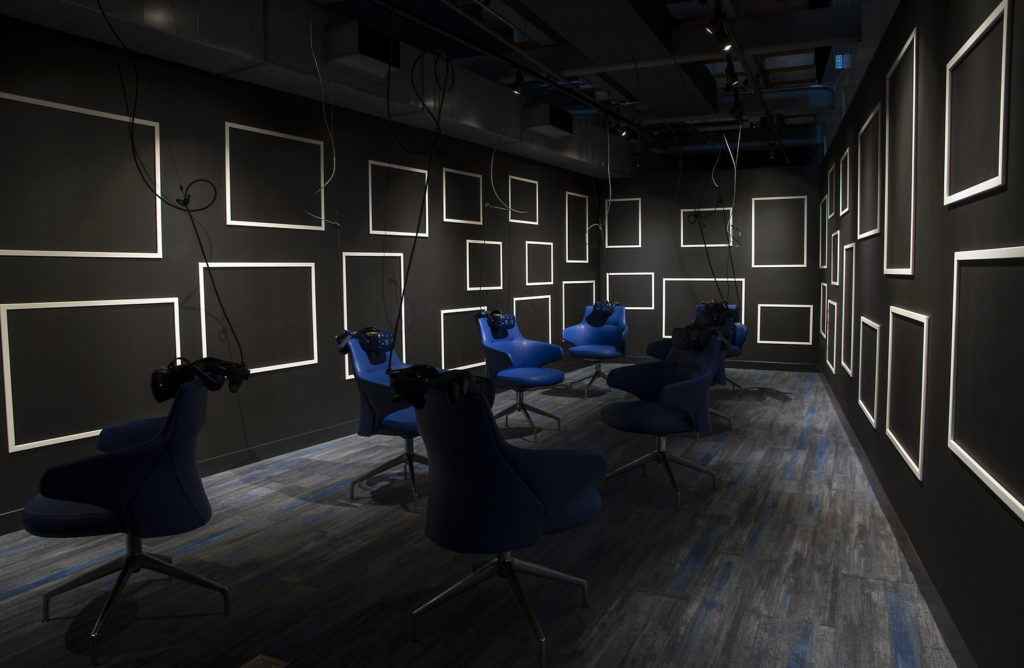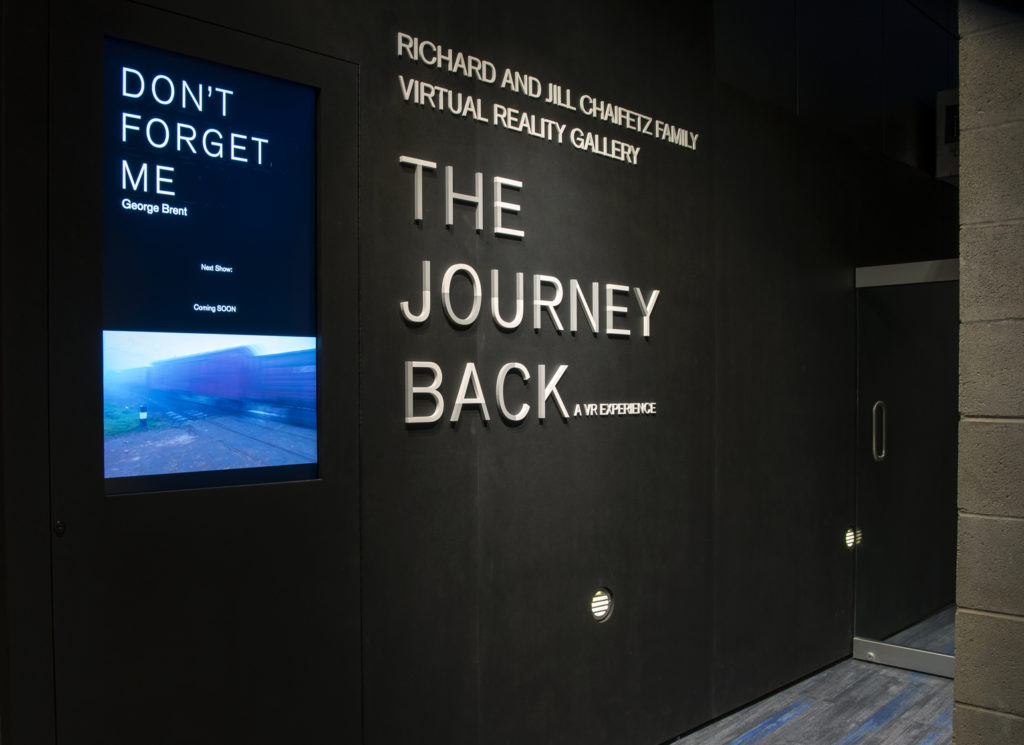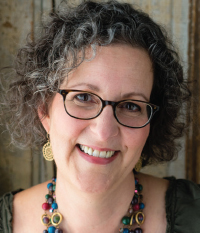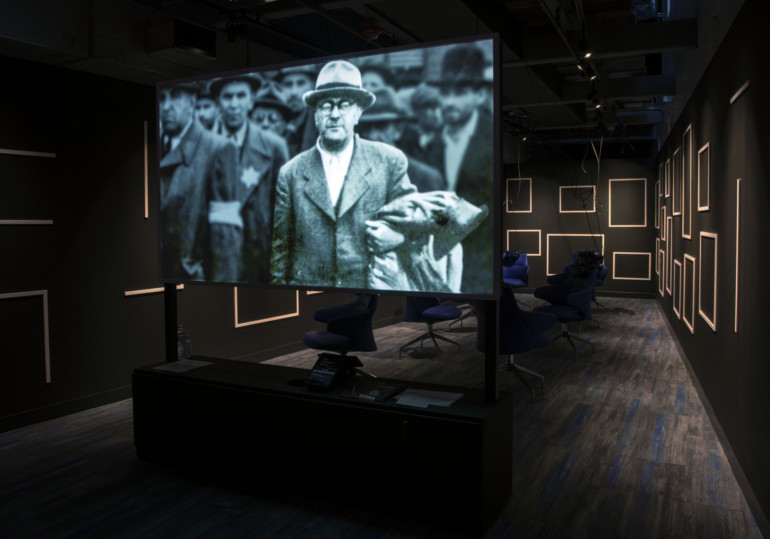This year’s annual International Holocaust Remembrance Day has come and gone. Held each year on January 27, the anniversary of the American liberation of Auschwitz-Birkenau concentration camp, it commemorates the lives of the more than six million European Jews — and millions of others, including Romas, LGBTQIA+, and the differently abled — who were victims of the Nazis. One day of the year in which to remember this monumental tragedy. It hardly seems adequate, but we must never forget, and the day of remembrance is one way for humanity to honor that pledge.
For those of us living in or visiting the Chicago area, there is a less ephemeral option, a place to “Remember the past, Transform the future”: The Illinois Holocaust Museum and Education Center (ILHMEC) in Skokie, founded by Holocaust survivors. Designed by internationally renowned architect Stanley Tigerman, the 65,000-square-foot space takes you on a journey from darkness to light, both literally and figuratively.
If you’ve never been to the museum, or haven’t been recently, you’re past due for a visit, because there’s always something new to witness, something vital from which to learn. It has become a museum dedicated not only to the Holocaust, but to all human rights, including exhibitions that champion LGBTQIA+ rights, racial equality, activism, and social justice. This is how we remember the past and transform the future. ILHMEC shares a call to action: Learn from the mistakes of the past; take a stand for a brighter future for all.

Their newest exhibit, “The Journey Back: A VR Experience,” opened on January 27, 2022. It gives you the unprecedented opportunity to experience aspects of the Holocaust through the eyes of two local survivors, George Brent and the late Fritzie Fritzhall, as they journey back to their hometowns and to the concentration camps. Their two films, “Don’t Forget Me” and “A Promise Kept” respectively, alternate monthly. “Nothing makes more of an impact than a first-hand account of these horrors,” says Kelley Szany, VP of Education and Exhibitions at ILHMEC. “We are constantly searching for innovative and new ways of preserving these stories… curating the best and most impactful ways to communicate the realities of the Holocaust.”
Compiled in a process called “photogrammetry,” the films are a technological marvel. The three-dimensional, 360° virtual-reality work is stitched together from a year’s worth —hundreds of thousands — of digital photos, drone footage, and archival film to create a haunting simulated environment. Enter the exhibition space and sit in one of the eight socially distanced chairs; the railroad tracks and German-period rail car above you signal the journey you will soon embark upon. A museum docent can help you put on one of the carefully sanitized, adjustable VR headsets. The movie begins, the world around you disappears, and you are fully immersed in the Survivor’s story. Elie Wiesel’s famous quote resounds in your ears: “Whoever listens to a witness, becomes a witness.”
Brent and Fritzhall are the tail end of the Survivors’ generation — indeed, Fritzhall, a founder and past Board President of ILHMEC — died in 2021 after filming was completed. Only teens when they were deported to the camps, the films bearing testimony to their experiences preserve their stories for our children and future generations. Their life-size projections lead you through the journey, from the packed railway cars that took them away from the only life they knew to the forbidding concentration camps, where they were separated from their families, many of whom died in the gas chambers. You get a sense of the scope of devastation and isolation in the camps as they describe the living conditions and forced labor.
The films’ titles are in themselves meaningful: Brent’s “Don’t Forget Me” echoes the last words Brent’s father spoke to him when they were separated, while “A Promise Kept” refers to Fritzhall’s promise to the 600 women at Auschwitz who helped her survive: that she would live to tell their story. That these Survivors were able to record and relive their stories is testament to their personal strength of will, and the urgency of their mission.

“This impactful, powerful, and emotional experience is the first of its kind,” says Susan Abrams, CEO of ILHMEC. “The experience sticks with visitors much longer than a typical Museum exhibit. Through cutting-edge technology, visitors are immersed in the sites where these atrocities took place and experience the moment standing next to a Survivor. It creates a new level of understanding of the realities of the Holocaust.”
It is only through the act of remembering the Holocaust — difficult though it may be — that we can hope that it can never be repeated. “It could never happen here!” was a phrase I often heard growing up in the Detroit suburbs of the 1960s and ‘70s, surrounded by both Holocaust survivors and Jews whose families presciently moved to America before the Nazis came to power. Adults I trusted were secure in that knowledge. Not in our America. Never here! I wish now I could be so sure. It is too easy to bury our heads in the sand when subjects are difficult, or to bear testimony to that which is often heart wrenching to witness.
“With prevalent misinformation surrounding the Holocaust and the dwindling number of Survivors, this mission takes on ever greater importance,” shares Abrams. “That is why Illinois Holocaust Museum is spearheading the use of innovative technology to connect the past to the present and tell the stories of the Holocaust in the most impactful ways.” We must never forget man’s inhumanity to man, and how slippery the slope to fascism can be. Never forget.
Visitors can experience “The Journey Back” at Illinois Holocaust Museum by reserving a timeslot in advance at www.ilholocaustmuseum.org/ticketing. The exhibit is complimentary with Museum admission. ILHEMC, 9603 Woods Dr., Skokie, Illinois, 847-967-4800.
More from Better:
- 31 of the Best Things to Do in Chicago and the Suburbs in January 2022
- Charlie Saffro, Founder of CS Recruiting, Talks CSR and Giving Back
- 14 New Chicago Restaurants to Check Out This Winter 2022

Julie Chernoff, Better’s dining editor since its inception in 2007, graduated from Yale University with a degree in English — which she speaks fluently — and added a professional chef’s degree from the California Culinary Academy. She has worked for Boz Scaggs, Rick Bayless, and Wolfgang Puck (not all at the same time); and counts Northlight Theatre and Les Dames d’Escoffier International as two of her favorite nonprofits. She currently serves on the national board of MAZON: A Jewish Response to Hunger, an advocacy group addressing hunger issues in the U.S. and Israel for the nearly 46 million people — veterans, children, seniors, tribal nations, and more — who go to bed hungry every night.

